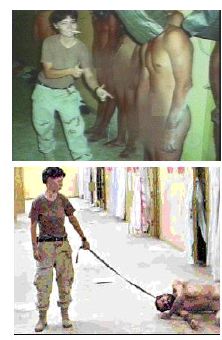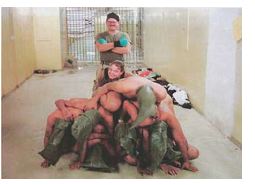
News
Behind the Headlines
Two-Cents Worth
Video of the Week
News Blurbs
Articles
Testimony
Bible Questions
Internet
Articles (2012)
Internet Articles (2011)
Internet Articles (2010)
Internet Articles
(2009)
Internet Articles (2008)
Internet Articles (2007)
Internet Articles (2006)
Internet Articles (2005)
Internet Articles (2004)
Internet Articles (2003)
Internet Articles (2002)
Internet Articles (2001)

Remember Pfc. Lynndie England? She became infamous over the photos of her laughing as she points to the genitals of detainees. She needs to face some real serious prison time.
 Do you remember Pfc. Lynndie England? She was one of the first eight army enlisted personnel relieved of duty in the Abu Ghraib Prison scandal. England was the first woman mentioned in the scandal because among the photos initially published by CBS were two very
Do you remember Pfc. Lynndie England? She was one of the first eight army enlisted personnel relieved of duty in the Abu Ghraib Prison scandal. England was the first woman mentioned in the scandal because among the photos initially published by CBS were two very  shocking photos of her belittling naked Muslim detainees. The first photo released was of England, a cigarette sticking from the cormer of her mouth, laughing as she pointed to the genitals of hooded Islamic rebels. In the second photo, England was shown dragging a naked Islamic rebel on a leash.
shocking photos of her belittling naked Muslim detainees. The first photo released was of England, a cigarette sticking from the cormer of her mouth, laughing as she pointed to the genitals of hooded Islamic rebels. In the second photo, England was shown dragging a naked Islamic rebel on a leash.
The photos of Private England do not, by any means, depict a lady. Married and divorced before she joined the army, England was pregnant from an affair with another of those charged in the sex abuse scandal at Abu Ghraib, Spc. Charles A. Graner. According to those in her outfit, England was one of those female military types who wanted to be "one of the guys." She talks like a truck driver and acts like Rambo. By her actions at Abu Ghraib, it is clear that England was not only amused by sadistic brutality, she enjoyed inflicting pain on the detainees in Cellblock 1-A—who were the most hardcore detainees to be interrogated by the CIA and the civilian interrogators. Of all those charged in the Abu Ghraib prison scandal, Pfc. Lynndie England must receive the toughest prison sentence.
The incident that provoked the photo op seen 'round the world was a prison riot at Abu Ghraib that was the direct result of systemic senior management problems at the prison from June, 2002 that climaxed with a major riot in November of that year. Those systemic problems must be attributed directly and solely to the absentee prison  commandant, Brig. Gen. Janis Karpinski who visited the prison only when she was notified there would be a media photo op (as there was when Defense Secretary Donald Rumsfeld visited the prison shortly before the abuse scandal broke last year).
commandant, Brig. Gen. Janis Karpinski who visited the prison only when she was notified there would be a media photo op (as there was when Defense Secretary Donald Rumsfeld visited the prison shortly before the abuse scandal broke last year).
The problem began with overcrowding in the prison population that led to the near starvation of hundreds of detainees (that quite naturally led to riots). Since she was the person singularly responsible for the prison population, Karpinski should have notified her superiors that the prison population at Abu Ghraib was far beyond capacity. Karpinski should also have insisted that if she was going to be required to house prisoners beyond the system's capacity, she needed more troops—and she needed to receive food supplies sufficient to meet the demands of the increased prison population. She did not. She failed to do her duty. Karpinski feigns ignorance of any of the problems at Abu Ghraib, but Maj. David DiNenna, the Operations Officer at the prison, reported the food shortages at Abu Ghraib daily. In his reports. In October, 2002 he expressed fear that the food shortages would trigger a riot from some or all of the 7,000 detainees at the prison since hundreds of detainees left the chow lines without getting fed simply because the "kitchen" had run out of food. Other inmates threw their food back at those serving it since much of the food served was spoiled. A month after DiNenna's frustrating October plea in which he asked: "Who the hell can fix this?" a major riot took place, requiring 70 soldiers to put it down. Four inmates were killed in the riot because the soldiers ran out of rubber bullets that would had disabled the prisoners without shedding blood, and they had to fire lethal rounds to put down the rebellion.
Five hundred army personnel served in the prison garrison, which came under regular attack from insurgents from Fallujah. Most of the soldiers assigned to Abu Ghraib were needed to protect the perimeters from the Islamic insurgents who attacked daily. Ninety-two soldiers were assigned to guard 7,000 prisoners. This meant those assigned as guards were forced to work double shifts weeks at-a-time without relief. Sanitary conditions were medieval. The stench of human waste was unbearable for inmates and guards alike. In the independent investigation led by former Defense Secretary James Schlesinger that took place in the aftermath of the scandal, Col. Henry Nelson, an Air Force psychiatrist, concluded that conditions at Abu Ghraib "...would grind down even the most motivated soldier...Given this atmosphere," he said, "of danger, promiscuity and negativity, the worst human qualities came to the fore." The investigators concluded that senior military management responded too slowly to the needs of the field commanders at Abu Ghraib and because of that failure, the abuses that took place, occurred.
 The first soldier to face charges, Spc. Jeremy Sivits, pleaded guilty earlier this year and is now offering testimony against other members of the 372nd Military Police Company with whom he served at Abu Ghraib. Sivits is currently testifying against England in her Article 32 hearing at Fort Bragg, North Carolina. England's lover, Spec. Charles Graner who, is facing trial in Baghdad, has applied for a change of venue. Three other former Abu Ghraib Cellblock 1-A guards had their Article 32 hearings at the U.S. Army base in Mannheim, Germany. Sgt. Ivan "Chip" Frederick will plead guilty so some of the charges against him. Frederick is charged with conspiracy, dereliction of duty, cruelty, maltreatment of prisoners, assault and indecent acts. Also facing Article 32 hearings at Mannheim were Spc. Megan Ambuhl and Sgt. Javal Davis. The judge suspended the case against Ambuhl, telling the JAG prosecutors that the military did a poor job of investigating some of the charges against her. The government must decide if it is going to reinvestigate the allegations against her, or settle with charging her with failure to intervene or report the abuses she witnessed to a superior officer.
The first soldier to face charges, Spc. Jeremy Sivits, pleaded guilty earlier this year and is now offering testimony against other members of the 372nd Military Police Company with whom he served at Abu Ghraib. Sivits is currently testifying against England in her Article 32 hearing at Fort Bragg, North Carolina. England's lover, Spec. Charles Graner who, is facing trial in Baghdad, has applied for a change of venue. Three other former Abu Ghraib Cellblock 1-A guards had their Article 32 hearings at the U.S. Army base in Mannheim, Germany. Sgt. Ivan "Chip" Frederick will plead guilty so some of the charges against him. Frederick is charged with conspiracy, dereliction of duty, cruelty, maltreatment of prisoners, assault and indecent acts. Also facing Article 32 hearings at Mannheim were Spc. Megan Ambuhl and Sgt. Javal Davis. The judge suspended the case against Ambuhl, telling the JAG prosecutors that the military did a poor job of investigating some of the charges against her. The government must decide if it is going to reinvestigate the allegations against her, or settle with charging her with failure to intervene or report the abuses she witnessed to a superior officer.
That charge, from a civilian perspective, is stupid since her "superior officer" was anyone of a higher rank, specifically Sgt. Kenneth Davis (who is now testifying against his comrades), Sgt. Javal Davis—who has been charged, and Frederick, who, likewise, has been charged. As he testified against England in her Article 32 hearing, Sivits told the JAG court that "...he knew what he was seeing was wrong..." but was told by Graner—who was a superior noncon—that he "...did not see anything," a statement Sivits took as a direct order from a superior officer to keep his mouth shut. Ambuhl's attorney, Capt. Jennifer Crawford, will use that argument on the last remaining charge against her client.
England's
attorney, Rick Hernandez is attempting
to call hundreds of witnesses—most of whom are senior military officers
and civilian officials in the Pentagon. Hernandez
is attempting to subpoena both Defense Secretary
Donald Rumsfeld and Vice President
Dick Cheney. Hernandez
is trying to make England's Article
32 hearing a referendum not on who participated in the abuses, but whether
or not they were unofficially sanctioned by the Pentagon and/or the White
House. Hernandez hopes that if he
can rachet up enough heat, the charges against his client—whom he
views as a bit player—will either be  reduced
or dropped. England faces a maximum
penalty of 38 years on 19 charges of abuse and indecency.
reduced
or dropped. England faces a maximum
penalty of 38 years on 19 charges of abuse and indecency.
While England may be a "bit" player in the whole scheme of things that took place in Prison Tier 1-A, she is the most criminally culpable because unlike the other members of the 372nd Military Police Company of the 800th Military Police Brigade, who can claim they were ordered to perform the abuses that took place in Tier 1-A, England was not a guard at Abu Ghraib and she was not ordered to do anything—except to stay out of Cellblock 1-A. England was an office clerk. She was not an MP and did not belong in any area where detainees where quartered or questioned. In fact, according to Capt. Crystal Jennings, the JAG prosecutor, England was specifically ordered to stay out of Tier 1-A. "It's clear [she] was not an MP," Jennings told the court. "She was not recruited into a secret military mission as the defense would have you believe. She was there to have fun."
And fun, to England, was inflicting pain and humiliation on inmates who were protected by the Geneva Convention. After the November riot in which four detainees were killed, Sivits said he encountered  England, Frederick, Graner and others with a group of detainees whom were believed to have been the ringleaders of the riot. Sivits said "...[t]hey"— England included—"...were stomping on the fingers and toes of the detainees." England, at that time, was ordered to leave the area. She did not. Sgt. Kenneth Davis testified that shortly after the finger stomping, he witnessed England taking photographs of naked prisoners. England snapped the photo of Spc. Sabrina Harman (who was the second person charged in the Abu Ghraib scandal) and her lover, Graner, posing behind a pile of nude, hooded, detainees. Other witnesses claim the idea of photographing naked detainees was England's idea—something the liberal media has suggested was initiated by CIA operatives and other civilian contract interrogators who wanted photographs that could be used to intimidate other detainees into talking.
England, Frederick, Graner and others with a group of detainees whom were believed to have been the ringleaders of the riot. Sivits said "...[t]hey"— England included—"...were stomping on the fingers and toes of the detainees." England, at that time, was ordered to leave the area. She did not. Sgt. Kenneth Davis testified that shortly after the finger stomping, he witnessed England taking photographs of naked prisoners. England snapped the photo of Spc. Sabrina Harman (who was the second person charged in the Abu Ghraib scandal) and her lover, Graner, posing behind a pile of nude, hooded, detainees. Other witnesses claim the idea of photographing naked detainees was England's idea—something the liberal media has suggested was initiated by CIA operatives and other civilian contract interrogators who wanted photographs that could be used to intimidate other detainees into talking.
While those charged are pointing fingers away from themselves, claiming they were ordered by the "secret services" people [i.e., the CIA and the DIA] to inflict humiliation on the detainees, there is little doubt that once the sexual abuses began at the hands of Graner, England, former corrections officer Chip Frederick and Javal Davis, they were eagerly encouraged to continue by the civilian interrogators who were not concerned with violations of the Geneva Convention as long as they were propagated by someone else. However, while encouraging others to commit a crime may legally make them accomplishes after-the-fact, it does not excuse or exonerate the perpetrators, nor does it mitigate what they did and make them less guilty.
However, all of those who stand accused did what they did out a misguided sense of duty—except one. England, who was not an MP and had no business being in Tier 1-A, stands condemned because what she did she did out of a warped sense of amusement. Her civilian lawyers will do everything they can to make a sideshow out of her Article 32 hearing by attempting to subpoena every Bush Administration official even vaguely associated with the War on Terrorism in an effort to generate so much pre-election publicity that the Administration will be willing to do just about anything to make the case go away—just shy, that is, of giving England a Silver Star, a Bronze Star and three Purple Hearts. Lynndie England is the epitome of what's wrong with the feminization of the military.
As Andrew Bacevich noted in the upcoming Sept. 13 issue of American Conservative: "Before the jaws of military justice close and Private England vanishes from sight, let us pause briefly to mark her fate: roadkill on the freedom trail..." And, rightly so—even though Bacevich views England as a victim and not a criminal. Of all of those charged, and those who will be charged, and those military officers and civilian officials whose careers will ultimately end because they share they blame for the lack of senior level oversight of Abu Ghraib and the other prisons and detention camps holding Islamic insurgents from all over the world, let me say this: only Pfc. Lynndie England deserves a stiff prison sentence because, once again, she committed her crimes for her own amusement and not out of any misguided sense of duty.
Well, once again, you have my two cents worth.



Copyright © 2009 Jon Christian Ryter.
All rights reserved.


